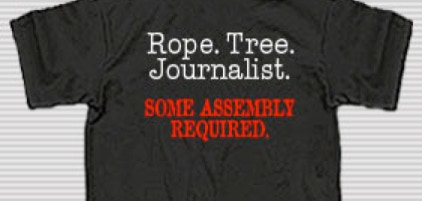
DOUG LANE WRITES:
WHAT’S NEW AND STRANGE? (THE BLOG)




MONDAY, NOVEMBER 7, 2016
ROPE. TREE. JOURNALIST.
At Sunday's rally in Minneapolis for Republican presidential candidate Donald Trump—who's made more than a few bones this election season decrying "the media" and members of the press with whom he disagrees as corrupt, crooked, and "the lowest form of humanity"—Reuters photographer Jonathan Ernst captured images of a Trump supporter wearing a t-shirt bearing the legend, "Rope. Tree. Journalist. SOME ASSEMBLY REQUIRED."
As Daffy Duck might say, ho ho. How droll.
Candidate Trump speaks a lot while saying very little. He's proven adept at lining up targets for the derision of his supporters and turning them loose. Religion, ethnicity, and gender have all been objects his disdain, but he's been especially rough with the media of late. He paints anyone who reports negatively about him as terribly biased liars who threaten to unfairly ruin him and, by extension, his followers. The messaging in Minnesota is a pretty clear: the Boss says journalists are bad, so they should be purged. Rational people might suggest media reform, or greater journalistic accountability, or perhaps even accepting how if you do or say questionable things, perhaps accept someone is going to challenge them. In Trumpworld? Easy, peasy: problematic reporters should be lynched. Welcome to the state of discourse, 2016.
No one claims journalists are perfect. Especially journalists. I've trained and worked as one. Avoiding errors and keeping bias out of reporting is a struggle for reporters of every stripe. People who report the news are still people, with feelings and opinions and hot buttons. Their challenge is not letting such personal things get between them and the facts. On the local level, it means being objective when you know the person whose name shows up in the police blotter or the tragedy unfolding before your eyes. On the national level, it's resisting the temptation to use your medium as a bully pulpit for things with which you agree, to tailor news to the viewer demographic, or weight coverage not to news-worthiness, but where the ratings or advertising are.
Part of the problem rests in the increasingly-fuzzy definition of what constitutes 'reporting' and 'the media'. The digital age has given great latitude for anyone to report what they see, but has also eliminated points of differentiation. A YouTube video by a college student stringing together hearsay and innuendo, three lobbyist 'experts' on a politically radical talk show, and The New York Times' double-sourced, on-the-record reportage all seem to attain the same validity to some users, simply because they all come over the internet and onto the same screen.
These disparate entities also get lumped together in one bucket as 'the media', the boogeyman you can blame for anything, no matter what your political bearing. 'The Media' is the same sort of useless broad-brush descriptive ghetto as any other generic plural. Shouting how 'the media' is corrupt because a Washington Post reporter misstated a fact (and admitted such) is like shouting 'the cops' are corrupt because a small-town sheriff deputy set up an illegal speed trap. People who deal in these broad labels—as candidate Trump does—know they're nonsensical. They also know these generalities are easy to sell to an audience. They offer an enemy who appears large, chaotic, out of control; and best of all, the audience infers their own definition based on however the speaker packages the message.
In theory, the 24-hour news channel is a brilliant opportunity. In practice, filling time has slowly resulted in greater amounts of toxic, non-news by-product: editorializing presented as reporting, talking heads with agendas treated as scholars, and actual, factual news relegated to the top of the hour, acting as introduction to roundtable discussion that's ultimately light on fact and heavy on opinion, supposition, and massaging of facts. What's wrong with the 24-hour news format is reparable, but companies need to want to change. It would be breathtaking to see a CNN, a FOX, an MSNBC take half of the on-air time devoted to talking heads chewing rhetorical cud and replace it with reporting of regional and local stories. The barrage of opinion masquerading as news has eroded our empathy for our fellow Americans. I believe we could all benefit from actually knowing what each other is dealing with, and at times other than when a natural disaster hits or a marquee story breaks. It's time for news outlets to stop worrying about being the first and highest-rated, and focus on being the most accurate, trustworthy, and honest.
But the sentiment at the root of the Minneapolis t-shirt slogan is the greatest threat. The unspoken element beneath 'Rope. Tree. Journalist' is the silent acceptance of a press muzzled by government. Without a free press, you'd never hear of a Watergate, a Flint water crisis, a Standing Rock protest, or anything suggesting unrest. A state-run media equates to zero accountability for people in power. Dissent is buried. Unrest becomes a myth. The first thing despots need in order to thrive is the removal of the system that keeps them honest, and their easiest weapon is the sort of person who thinks killing those who disagree with you is dandy-fine.
A reporter with whom you disagree may be different from a reporter who is biased. A reporter with whom you agree may be different from a reporter who is honest. Fight to combat actual bias. Work to ensure you're getting the whole story. But don't demonize journalists in general solely because someone who wants to run the country tells you they're 'unfair' to him. That's the quickest way to ensure the throat of anyone who runs afoul of power can be cut on a whim.

